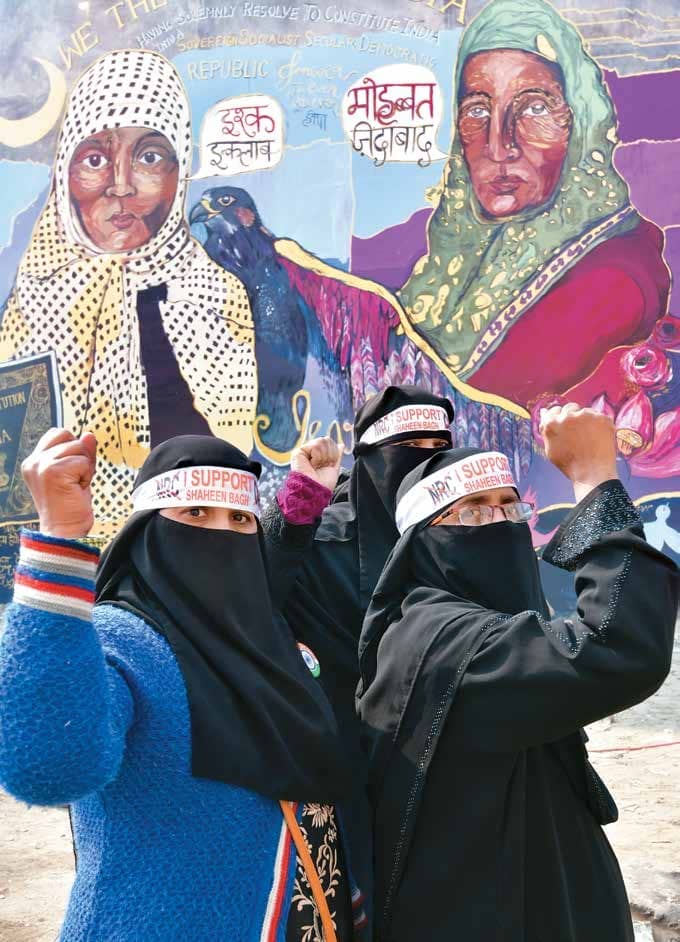
MANY Indians would know what I mean when I say that, by the time I reached the last month of 2019, I had exhausted the energy to keep up with the news of spreading communalism (and ‘news’ that spread communalism). The widely prevalent references to Nazi Germany and concentration camps to discuss the impending statelessness of millions of Indian Muslims was disconcerting on many counts. Honestly, it was devastating to have to come to terms that a vast majority of Indians were so full of hate that they did not care if a section of their compatriots were disenfranchised or condemned to an even worse fate. Or to have to acc ept that Indian Muslims were considered sitting ducks who could be dep orted en masse to detention camps without a whimper—as a famously told chronology would have it.
But that’s when the protests began. It began the day the Citizenship (Amendment) Bill 2019 was passed in the Rajya Sabha—first, Jamia Millia Islamia (JMI), a central university in Delhi, spoke up. Women students marched out of their hostels, braving the rain and biting cold. Three of them—Ayesha Renna, Ladeeda Farzana and Chanda Yadav—were iconised in a frame, their fists raised in slogans. It was this defiant image that first caught the attention of students and multitudes of citizens across the country. They wanted their voices to travel far, said Ayesha and Ladeeda. It did.
The police crackdown came soon. First, on a citizen’s march called by students. Then, inexplicably, mayhem inside the Jamia campus, in the library and mosque, with studying and praying students brutalised. The images were stark and shocking. We heard of worse from Aligarh Muslim University and elsewhere in UP. (Later, as visuals streamed out after an internet shutdown, the police action there recalled the wanton terror of private militia—‘ghar mein ghus kar marenge’ was no longer an empty threat.)
This story is from the February 17, 2020 edition of Outlook.
Start your 7-day Magzter GOLD free trial to access thousands of curated premium stories, and 9,000+ magazines and newspapers.
Already a subscriber ? Sign In
This story is from the February 17, 2020 edition of Outlook.
Start your 7-day Magzter GOLD free trial to access thousands of curated premium stories, and 9,000+ magazines and newspapers.
Already a subscriber? Sign In

Soft Ruins
'Soft Ruins' is a chapter within the long-term ongoing project \"When Spring Never Comes\", an expansive exploration of memory, identity and displacement in the aftermath of exile within contemporary global politics. It reflects on how the journey as an asylum seeker in Europe mirrors the instability and threats of life under dictatorship, amidst rising right-wing movements and shifting power dynamics, where both certainty and identity are redefined

Building Beyond Homes: Provident Housing's Transformative Approach
Provident Housing leads in crafting thoughtfully designed homes that cater to modern homebuyers' evolving needs. With a focus on timely delivery, sustainability, and innovative, customer-centric solutions, the company sets new benchmarks. In this exclusive interview, Mallanna Sasalu, CEO of Provident Housing, shares insights into the company's strategies, upcoming projects, and vision for India's housing future.

Syria Speaks
A Syrian graffiti artist-activist's tale of living through bombings, gunshots and displacement

The Burdened
Yemen, once a beautiful land identified with the Queen of Sheba, is now one of the worst ongoing humanitarian disasters of modern times

Sculpting In Time
Documentaries such as Intercepted and Songs of Slow Burning Earth grapple with the Russian occupation beyond displays of desolation

The Story Won't Die
Is Israel's triumphalism over its land grab in Syria realistic? The hard reality is-Israel now has Al-Qaeda as a next-door neighbour

Against the Loveless World
In times of war, love exists as a profound act of defiance

Soul of My Soul
What does it mean to continue to create art during a genocide?

in Dancing the Glory of Monsters
By humanising the stories of those affected by war, poverty and displacement, Buuma hopes to foster empathy and inspire action

All the President's Men
Co-author of All The President's Men and one of the two Washington Post journalists (the other was Carl Berntstein) who broke the Watergate scandal that brought down the President Richard Nixon administration in the United States in 1974, Bob Woodward's recent book War was on top of The New York Times Bestseller list, even above John Grisham.